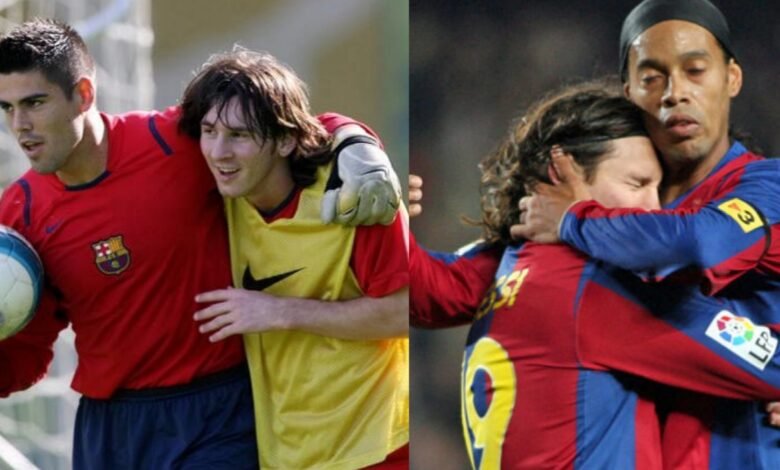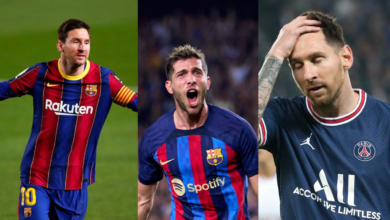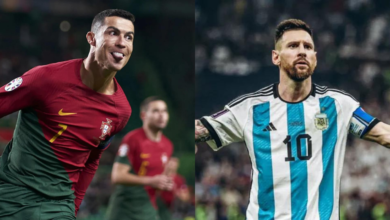
A few relationships are forged in heaven and despite all its crests and troughs, these relationships exemplify the true ethos of a bond. One such relationship that leaves the world in awe is that of Lionel Messi and Barcelona. Despite the bond being strained in recent years, the human-shaped titan has proven to the world that if you believe in your dreams, even the impossible becomes possible for you.
Watching Messi play isn’t just a sporting delight for the fans. It is an overwhelming roller-coaster of emotions running wild for every single minute that God plays on the field. However, do you ever think that, how did it feel when the Argentine sensation made his debut for Barcelona?
An unknown face, swathed in a ball of heightened expectations from his days in the youth academy, walked on the field for the first time, trying to make a living for himself in a star-studded Catalan side. It didn’t come easy, but every single second of struggle was absolutely worth it. Every single drop of sweat was worth it. More importantly, every single touch of the ball was amplified into a roar of emotions raging wild in the diminutive Argentine’s heart.
We will take a quick look at the playing eleven of the night when Lionel Messi made his debut for Argentina. It was on 16th October 2004 when Messi came out for the first time in Argentine colours in place of the goal-scorer Deco against Espanyol. The very opener didn’t really unleash the very remarkable in him, but the deft touch laced with some scintillating control made the world take note. Fast-forward five years, and the little magician set the world ablaze with mind-bending brilliance.
Goal-keeper: Victor Valdes
The beastly shot-stopper made inroads into the Catalan side in 2003. His resolute display underlined his majestic brilliance, and he managed to appear in 535 games, winning 6 La Liga titles and 3 UEFA Champions League titles. After leaving behind an impressive legacy at Camp Nou, he joined Manchester United, only to be a back-up to the superhuman David De Gea. Sadly, after spending a few years on the sidelines, Valdes shifted to Standard Liege and Middleborough before finally calling it quits.
Defenders: Giovanni van Bronckhorst, Carles Puyol, Olegeur Presas, Juliano Belleti
One of the mainstays from the iconic 1990s Netherlands team, van Bronckhorst switched his position from being a midfielder to a left-back and excelled in that position for the next five years. He was a part of the Catalans for a whopping 155 appearances, in which he registered 10 goals for the club. Post his brilliance at Barcelona, he returned to his first club, Feyenoord, and played for three long years before finally calling it a day. His thunderbolt from range against Uruguay in the 2010 FIFA World Cup is still regarded as one of the best World Cup goals of all time.
Known as the heart of the Barcelona and Spanish defence, Carles Puyol was a rock in the rearguard. He graduated through the club’s youth system and eventually exploded onto the main scene, plying his trade for the Catalans for a whopping 593 matches scoring 18 goals in the process, His trophy cabinet at Barcelona read 20 titles which starred 6 la Ligas and 3 UCLs. He scored that all-important goal against Germany in the 2010 World Cup semi-final surging them to their maiden World Cup final, which they would eventually win, riding on a clinical strike from Andres Iniesta.
A career that could have seen much greater heights was snuffed out due to political involvement. Presas partnered Puyol in a remarkable center-back pairing that saw the duo forging one of the best partnerships before the arrival of Ramos and Pepe in Real. He starred in 167 appearances for Barcelona before moving to Ajax to feature in 57 games.
Before Olegeur Presas finally established himself as a right-back, it was Juliano Belletti who commanded the position with an exemplary blitz in the right. He joined Barcelona in 2004 from Villareal and struck the golden blow against Arsenal in the 2006 UCL final that won them the trophy. After playing 105 games for Barcelona, he dished out a short stint with Fluminense before finally bowing out of the game due to an Achilles injury.
Midfielders: Rafael Marquez, Deco, Xavi, Ronaldinho
The Mexican icon, Rafael Marquez was a central defender who switched his roles to that of defensive midfield for Barcelona and excelled remarkably in the newly shouldered onus. His stellar ball-control coupled with some accurate passing made him one of the finest players to grace Camp Nou. After joining Barcelona in 2003 from Monaco, he played 7 years for them before finally bidding adieu to Camp Nou. He did continue playing for the next few years, starring for New York Red Bulls, Hellas Verona and Atlas.
Before appearing for Barcelona, Deco already left the world in awe of him when he played with Porto under the chaperonage of José Mourinho, winning the UCL with them and also becoming the UEFA midfielder of the year. He then arrived at Camp Nou in 2004 and belted out four remarkable seasons for Barcelona. From the 161 matches that he played for the club, he managed to net 22 goals and also notch up the Champions League with them too. After Barcelona, he had a couple of short bursts with Fluminense and Chelsea before finally calling it a day.
Starting his Barcelona days in 1998, he was promoted as a vice-captain for the Catalans when Messi made his debut. He was also one of the most beloved Barcelona midfielders. He mastered the most impressive stint for the Catalans alongside Iniesta and Busquets that would eventually make the Barcelona midfield the strongest in the world. He registered 85 goals from 767 matches for Barcelona, but it was his assists that made him one of the best midfielders in the world.
Barcelona was about spewing magic in the midfield and talking about magic, you won’t find a better talisman than the Brazilian artist, Ronaldinho Gaucho. He signed for Barcelona from PSG in 2003. In 2004, he was named the FIFA Player of the World. His partnership with Samuel Eto forged another golden era in the Barcelona attacking third. He scored 94 goals for the Catalans and left an enviable legacy behind him.
Forwards: Samuel Eto’o, Henrik Larsson
Samuel Eto’o manifested himself as one of the natural goal-scorers in the Catalan ranks, and his attacking prowess struck gold for Barcelona in amplified terms. He was one of the crucial cogs in Barcelona ranks in 2006 and helped them in landing the Treble. He scored 130 netters from 199 appearances before finally bidding adieu to Barcelona to feature in the ranks of Inter Milan. In his club career, he scored 368 goals from the 753 matches that he starred in.
Despite Zlatan being the epitome of Swedish football, Larsson was a hidden gem and one of the most underrated stars of Sweden. Larsson’s best came for Celtic, where he went onto score 242 goals from 313 appearances. However, at Barcelona, his prolific goal-scoring flair for the Catalans fell short as he could only conjure 19 goals from 59 matches. However, it was Larsson who could conjure a couple of magical assists against Arsenal in the 2006 UCL final.
Messi came on as a substitute in place of Deco in the 82nd minute and didn’t really disseminate magic but his mastery over the ball and some swift twist and turns, leaving the defenders tied in a knot on a couple of occasions was more than enough to let the world know that was to unfold in the forthcoming years.




